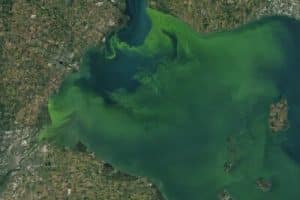News
Grant Allows College of Charleston Students, Professor to Launch Project With Groundbreaking Potential
By: CofC Media
Combine NASA and Silicon Valley and you come up with one of the most cutting-edge places in the world – the Ames Research Center in Mountain View, California. Since 1939, state-of-the-art facilities and world-class talent have melded to produce breakthroughs in everything from aeronautics and space to human biology and disease.
Now, the College of Charleston is set to become part of that illustrious history. NASA and the National Science Foundation have awarded geology associate professor Adem Ali a $300,000 award to study harmful algal blooms (HABs) and their effect on fisheries, tourism and human health due to the harmful toxins they disperse. Using the latest NASA satellite technology, this research fellowship will provide accurate information on the spatial and temporal distribution of HABs in coastal regions.
“I am incredibly excited about this opportunity and the potential impact it holds,” says Ali, who is also the director of the College’s graduate program in environmental and sustainability studies. “The potential impact of this project is groundbreaking, as it has the capacity to revolutionize HAB monitoring and management, surpassing the limitations of traditional methods.”
The two-year project will begin in earnest next spring when Ali and a team of CofC students, including undergraduates and a graduate student, will spend six months working alongside NASA experts at Ames to explore the utility of new-generation hyperspectral satellite data and to develop novel algorithms. They will have access to NASA’s advanced facilities and infrastructure, such as the High-End Computing Capability (HECC) and the Hyperwall for 3D visualization, to facilitate fast data processing and analysis of large datasets.
“Living and working here in a coastal community makes this research especially meaningful to me and all Charlestonians,” says Sebastian van Delden, dean of the College’s School of Sciences, Mathematics, and Engineering. “Dr. Ali’s highly sophisticated work with NASA will help us preserve our waterways and waterfronts for future generations of recreation, as well as thoughtful and environmentally conscious economic development.”
Ali and his team will also travel to South Africa for field calibration, providing vital support to NASA’s airborne campaign equipped with two imaging spectrometer sensors on board the agency’s Gulfstream III aircraft. This collaboration further underscores the profound significance of this project and its alignment with NASA’s broader scientific goals.
“This unique opportunity not only allows our students to contribute to high-level scientific research, but also enhances and transforms the research landscape at this institution,” Ali says. “It positions the College of Charleston to be more competitive in research and development, ultimately benefiting the scientific community and society at large.”

























